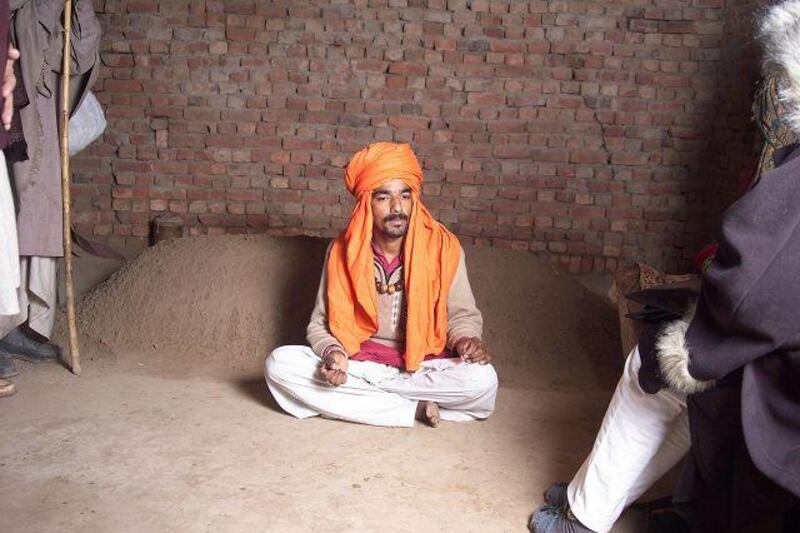SHEIKHUPURA // The grave was nearly two metres long, a metre wide and about two metres deep. It took 10 men a few hours to dig with onlookers dropping in to check on their progress. Though the task at hand was solemn, the mood was jovial, as this was no ordinary grave. Safdar Ali, for whom the grave was being dug within the mud walls of his parents' home in Toolanwali village in Pakistan's Multan province, was very much alive and looking forward to climbing in to the hole.
"Once I had decided to spend 41 hours in the grave, I couldn't wait for the preparations to be completed and to enter the grave," the 28-year-old man said, fiddling with his bright orange turban. "I was impatient to begin the process." The "process" was ordered at the behest of Mr Ali's guru, Saint Bhutta Sain, who claimed that 41 hours spent buried underground would cure his disciple of depression and epileptic fits, which he said were caused by possession.
Such beliefs are widespread in rural Pakistan, where the majority are illiterate and conventional health care is limited, and more people are turning to faith healers, also known as pirs, to cure them, said Shahid Nadeem, a social and cultural commentator. "Whenever someone in these areas falls ill or becomes depressed, the belief is that the spirits have got a hold of them, someone has cast a spell on him, or he is being punished for a wrong deed he committed earlier," he said.
There are thousands of pirs across Pakistan who promote black magic and superstitious rituals. And while genuine pirs are the descendants of Sufi Islam scholars, there are a growing number of fake healers, accused of exploiting their followers and encouraging them into darker exploits. Earlier this month, a couple in Karachi were arrested for murdering their four-month-old daughter at the behest of a pir, or saint, who said it would make them rich.
Mr Ali's parents said they agreed to bury their son underground because they did not know how else to help him. "He was miserable and would always be weeping and crying and wouldn't eat anything," his mother said. "We could never figure out what was wrong with him but we assumed that the spirits had got hold of him." Khalid Ali, Safdar's brother, said his sibling had been having fits since he was eight. "He would have these fits where fog would gather around his mouth and he would bite his tongue, causing blood to seep out," he said.
But rather than taking their son to a doctor, Mr Ali's parents - both of whom are illiterate - took him to a spirit healer. Mr Ali said he did not get on with the first healer. "He picked up sticks and began beating me up, chanting as he spoke. He kept beating me and screaming at the spirits to leave my body. By the end of it, I was bleeding and all bruised and couldn't even sit." His parents then took him to see others. "Sometimes a saint would give me some prayers to read and they would help," he said. "But no one was able to cure me."
No one that is, until he met Mr Sain in Multan. "Since meeting him and thanks to his prayers and wishes, I am absolutely fine and healed," said Mr Ali. "Now the fits come only rarely if at all and I don't feel as depressed as I used to." Mr Ali now lives in Multan where he spends his days serving Mr Sain, doing his chores, working his fields and massaging his feet in the evening. Qais Aslam, an economic analyst, said this culture of exploitation is becoming more common.
"These saints are also landlords and they use their stature and power to completely and utterly abuse and oppress the poor," Mr Aslam said. "By styling themselves as saints, they gain access to hundreds and thousands of people who are willing to work for them for free." When Mr Sain told Mr Ali to bury himself for 41 hours inside the house of his parents, he picked up his belongings and returned to his village without question.
After the grave was dug, his relatives surrounded the bed he was lying on, gave him a bath traditionally used to wash the dead, chanted prayers and helped him into the hole. Mr Ali, whose lanky frame stands at around five feet, took with him only 41 grains of wheat and one bowl of water. The grave was then covered with a slab of concrete that left only a hole wide enough for a long blade of dried grass.
"His instructions were that after 41 hours we should insert a blade of grass into the hole and watch to see if it moves," said Mr Ali's father, Ali Khan. "If it remains stationary, we should assume he is not breathing and leave him buried inside. But if it moves, then we should open the grave and bring him out." After 41 hours had passed, Mr Ali's father recited a prayer and gradually inserted a long blade of grass into the grave.
The blade began moving slightly. A cheer ran through the crowd, and Mr Ali's brothers and relatives dug up the grave, and extracted its dirty but subdued inhabitant. * The National





